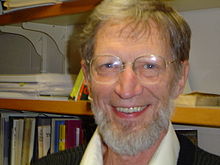
|
|
BIOGRAPHY OF ALVIN CARL PLANTINGA |
ALVIN CARL PLANTINGA (born November 15, 1932, Ann Arbor, Michigan) is an American analytic philosopher, the John A. O'Brien Professor of Philosophy Emeritus at the
University of Notre Dame and the inaugural holder of the Jellema Chair in Philosophy at Calvin College.
Plantinga is widely-known for his work in philosophy of religion, epistemology, metaphysics and Christian apologetics. He is the author of numerous
books including God and Other Minds (1967), The Nature of Necessity (1974), and a trilogy of books on epistemology, culminating in Warranted
Christian Belief (2000). He has delivered the Gifford Lectures three times and was described by Time Magazine as "America's leading orthodox
Protestant philosopher of God".
The central motto of his life and work is: Philosophy in Defense of Christian Belief.
Beginning in the fall of 1950, Plantinga spent two semesters at Harvard. In 1951, during Harvard's spring recess,
Plantinga attended a few philosophy classes at Calvin College, and was so impressed with Calvin philosophy professor William Harry Jellema that he
returned in 1951 to study philosophy under him. In 1954, Plantinga began his graduate studies at the University of Michigan where he studied
under William Alston, William Frankena, and Richard Cartwright, among others. A year later, in 1955, he transferred to Yale University where he
received his Ph.D. in 1958.
Plantinga began his career as an instructor in the philosophy department at Yale in 1957, and then in 1958 he became a professor of philosophy at
Wayne State University during its heyday as a major center for analytic philosophy. In 1963, he accepted a teaching job at Calvin College, where he
replaced the retiring Jellema.[20] He then spent the next 19 years at Calvin before moving to the University of Notre Dame in 1982. He retired from
the University of Notre Dame in 2010 and returned to Calvin College, where he serves as the first holder of the William Harry Jellema Chair in
Philosophy. He has trained many prominent philosophers working in metaphysics and epistemology including Michael Bergmann at Purdue and Michael Rea
at Notre Dame.
In his philosophy Plantinga has argued that some people can know that God exists as a basic belief, requiring no argument. He has developed this argument in two different fashions: firstly, in God and Other Minds, by drawing an equivalence between the teleological argument and the common sense view that people have of other minds existing by analogy with their own minds. Plantinga has also developed a more comprehensive epistemological account of the nature of warrant which allows for the existence of God as a basic belief. Plantinga has also argued that there is no logical inconsistency between the existence of evil and the existence of an all-powerful, all-knowing, wholly good God.
In the past, Plantinga has lent support to the intelligent design movement. He was a member of the 'Ad Hoc Origins Committee' that supported
Philip E. Johnson's book Darwin on Trial against palaeontologist Stephen Jay Gould's high profile scathing review in Scientific American in 1992.
He was a Fellow of the (now moribund) pro-intelligent design International
Society for Complexity, Information, and Design, and has presented at a number of intelligent design conferences.
In a March 2010 article in the Chronicle of Higher Education, philosopher of science Michael Ruse claims that Plantinga is an "open enthusiast of
intelligent design". In a letter to the editor, Plantinga has the following response:
Like any Christian (and indeed any theist), I believe that the world has been created by God, and hence "intelligently designed". The hallmark of
intelligent design, however, is the claim that this can be shown scientifically; I'm dubious about that. ...As far as I can see, God certainly could
have used Darwinian processes to create the living world and direct it as he wanted to go; hence evolution as such does not imply that there is no
direction in the history of life. What does have that implication is not evolutionary theory itself, but unguided evolution, the idea that neither
God nor any other person has taken a hand in guiding, directing or orchestrating the course of evolution. But the scientific theory of evolution,
sensibly enough, says nothing one way or the other about divine guidance. It doesn't say that evolution is divinely guided; it also doesn't say that
it isn't. Like almost any theist, I reject unguided evolution; but the contemporary scientific theory of evolution just as such—apart from
philosophical or theological add-ons—doesn't say that evolution is unguided. Like science in general, it makes no pronouncements on the existence or
activity of God.
Selected works by Alvin Plantinga:
God and Other Minds. Ithaca: Cornell University Press. 1967. rev. ed., 1990. ISBN 0-8014-9735-3
The Nature of Necessity. Oxford: Clarendon Press. 1974. ISBN 0-19-824404-5
God, Freedom, and Evil. Grand Rapids: Eerdmans. 1974. ISBN 0-04-100040-4
Does God Have A Nature? Wisconsin: Marquette University Press. 1980. ISBN 0-87462-145-3
Faith and Rationality: Reason and Belief in God (ed. with Nicholas Wolterstorff).
Notre Dame: University of Notre Dame Press. 1983. ISBN 0-268-00964-3
Warrant: the Current Debate. New York: Oxford University Press. 1993. ISBN 0-19-507861-6 (1987-1988 Gifford Lectures)
Warrant and Proper Function. Oxford: Oxford University Press. 1993. ISBN 0-19-507863-2 (1987-1988 Gifford Lectures)
Warranted Christian Belief. New York: Oxford University Press. 2000. ISBN 0-19-513192-4
Essays in the Metaphysics of Modality (ed.) Matthew Davidson. New York: Oxford University Press. 2003. ISBN 0-19-510376-9
Knowledge of God (with Michael Tooley). Oxford: Blackwell. 2008. ISBN 0-631-19364-2
Science and Religion (with Daniel Dennett). Oxford: Oxford University Press. 2010 ISBN 0-19-973842-4
Where the Conflict Really Lies: Science, Religion, and Naturalism. Oxford: Oxford University Press. 2011. ISBN 0-19-981209-8
There are a few places where the biography of ALVIN PLANTINGA can be found.
Wikipedia electronic Encyclopedia(http://en.wikipedia.org/) , an article ALVIN PLANTINGA.